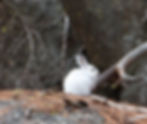



RESEARCH PHILOSOPHY
We are motivated by the idea that a greater understanding of how wildlife populations–and their associated communities and ecosystems–respond to environmental change is essential for developing science-informed strategies to conserve Earth’s biodiversity. However, science alone cannot save species from extinction. In fact, we believe the intentional inclusion of people with diverse knowledge, experiences, and identities in the conservation ecology pipeline is requisite for creating a more just world for all people and the wildlife that share our planet. As such, we strive to synergize conceptually rich hypothesis-driven research with mentoring, teaching and extension efforts to make meaningful advances in conservation ecology and to advance diversity, equity and inclusion in higher education. We achieve this by (a) establishing intentionally diverse teams of scientists to conduct rigorous basic and applied research that provides a basis for wildlife conservation and environmental policy decision-making, (b) engaging diverse stakeholders in our scientific process while also providing them the information and tools they need for real-world decision-making to enhance environmental stewardship, and (c) recruiting aspiring scientists (undergrads, grads, postdocs) that represent the diversity of our global society and training them in critical thinking, research methods, interdisciplinary collaboration, community engagement, and science communications so they can make fundamental and lasting contributions to conservation ecology and to our society.


OUR RESEARCH
A greater understanding of how wildlife populations–and their associated communities and ecosystems–respond to environmental change is essential for developing science-informed strategies to conserve Earth’s biodiversity. The WECOS Lab uses a combination of natural history observations, field-based monitoring, traditional and cutting-edge laboratory techniques, geographic information systems, statistical modeling bioinformatics analyses, and citizen science to investigate the ecological consequences of human-mediated environmental change using diverse taxonomic models (e.g., brown bear, American marten, wild boar, snowshoe hare, blue-spotted salamander, waterfowl). Consequently, our research extends beyond conservation ecology into other disciplines including microbiology, human dimensions of natural resource management, geography, and postsecondary science education. Learn more about our research by clicking on the boxes below.
























